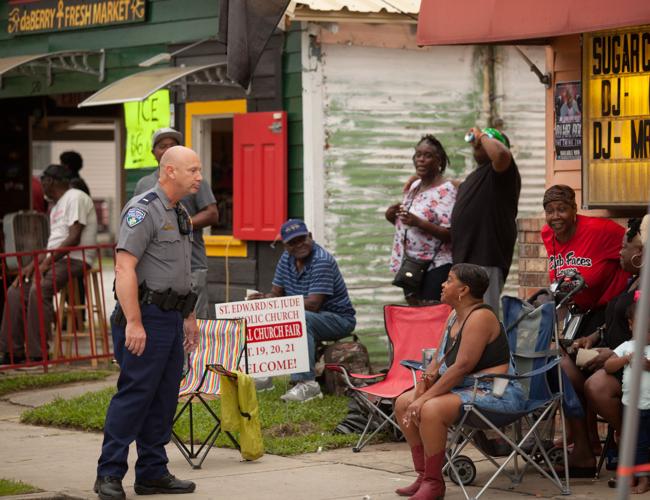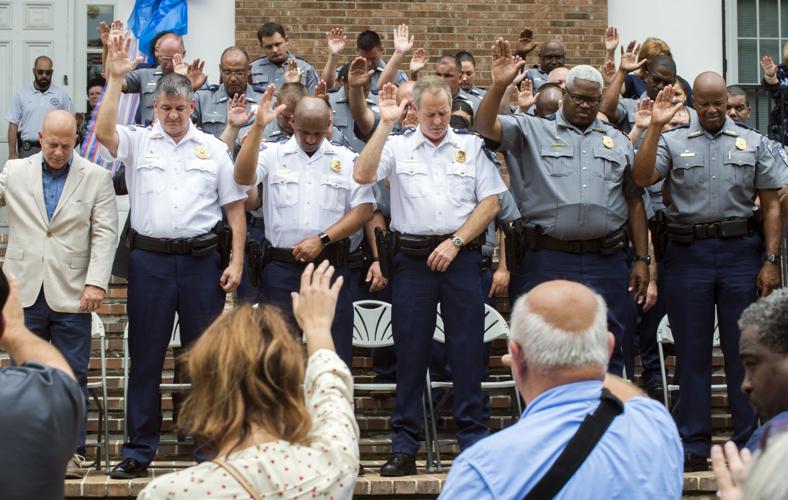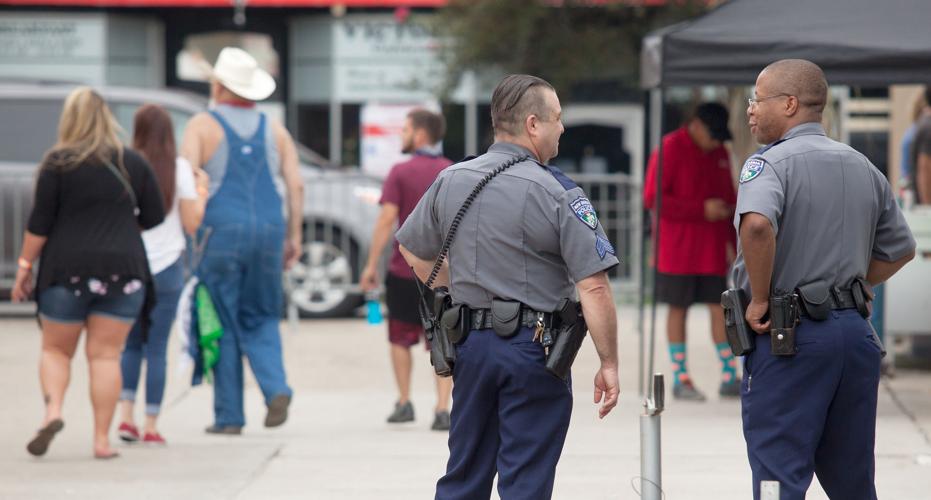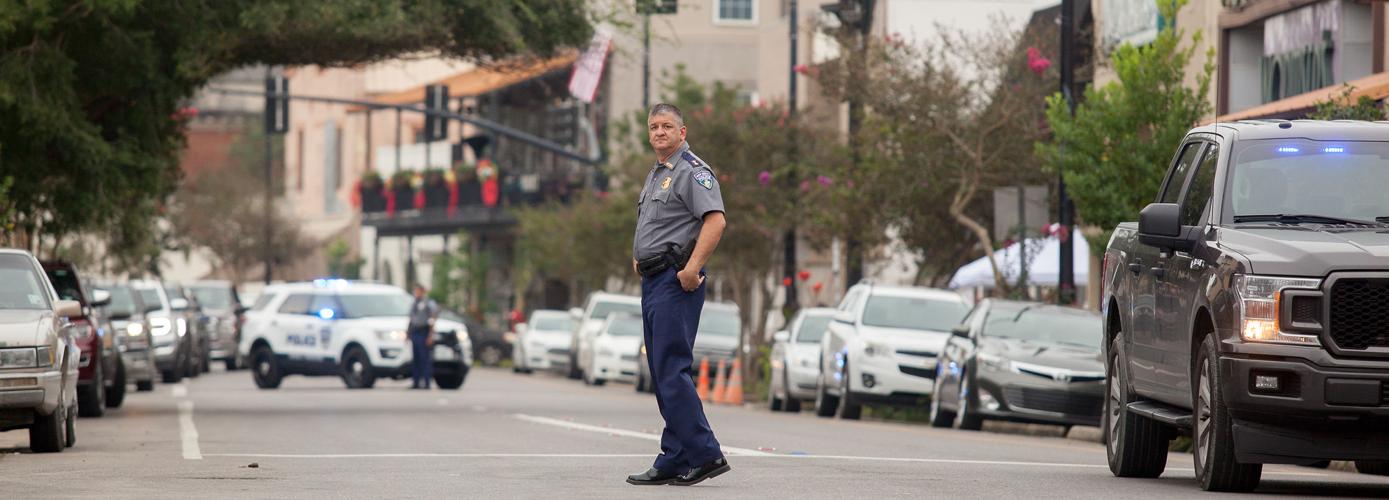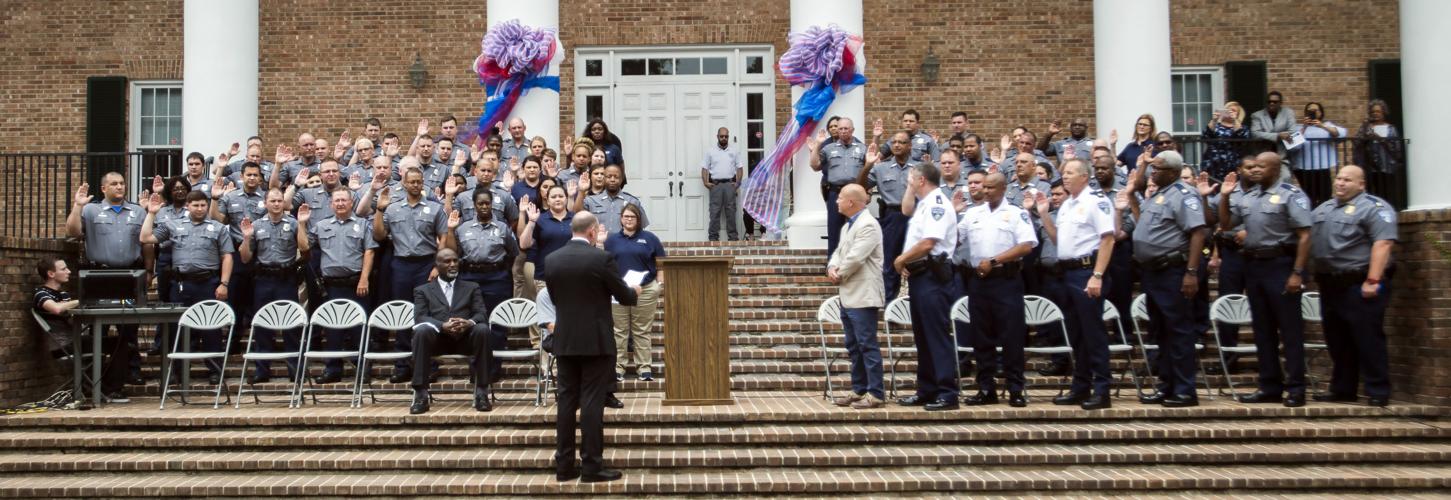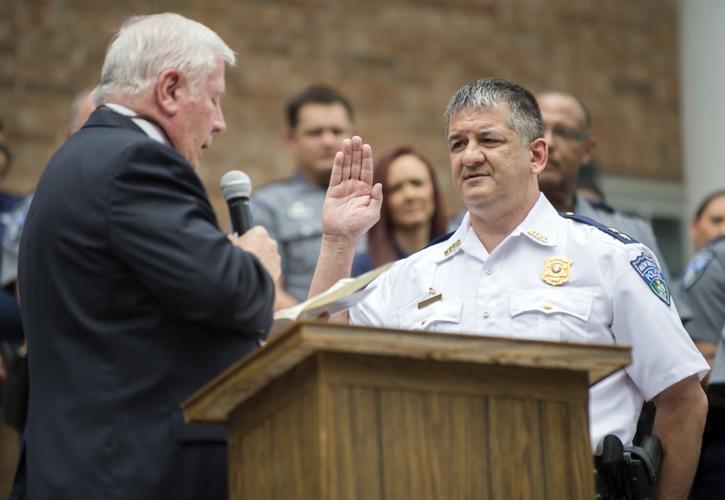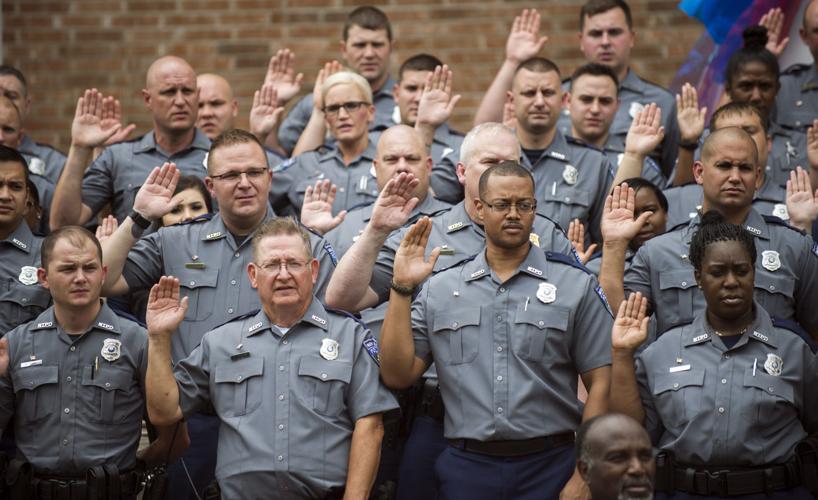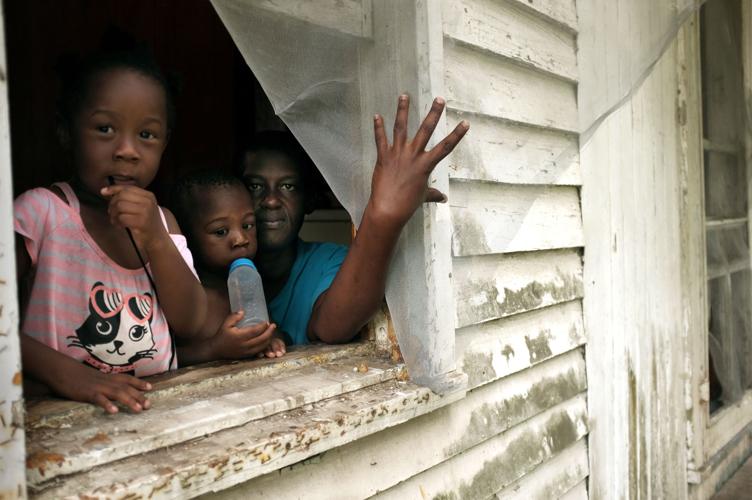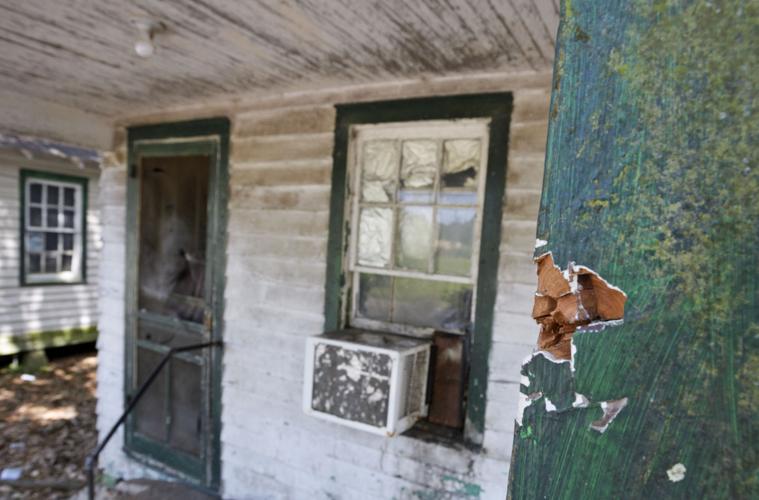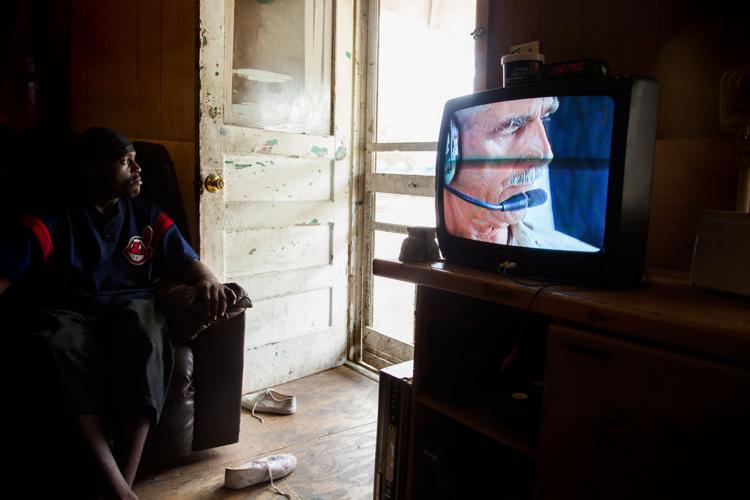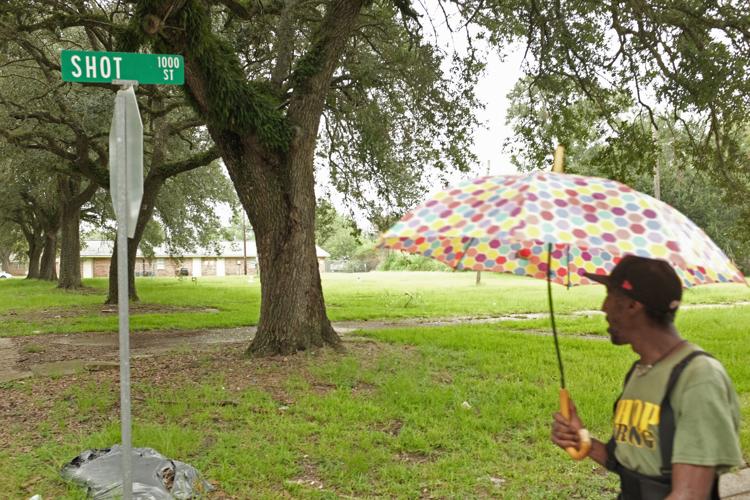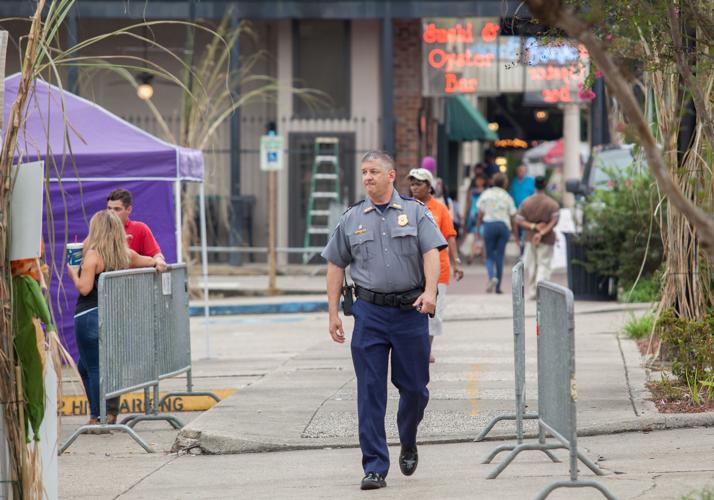Acadiana isn’t big on taxes, and its conservatism shows through at the ballot box.
So the choice that New Iberia voters confronted last year was a bitter one: Dig into their pockets, or let policing in the city remain in the hands of a Sheriff’s Office hobbled from scandal, and a leader, Sheriff Louis Ackal, tarnished by revelations of virulent racism and gratuitous beatings on his watch.
Turnout was low -- 21 percent -- on a warm Saturday in October. By 11 a.m., just two dozen voters had wandered in through the back of Anderson Middle School in the city’s historically black West End. A few African-American voters who supported the tax said it was less about jettisoning Ackal than about trying to head off a surge in crime across the city and especially in their neighborhood.
Citywide, 63 percent of voters favored raising the sales tax by a half-cent, allowing the city to cut the cord with the Sheriff's Office and bootstrap a new police department on a $7.7 million budget.
Even in areas that had once been Ackal strongholds — the predominantly white precincts straddling Bayou Teche — the measure passed easily, by a 3-2 margin.
But nowhere was the sentiment more resounding than across the tracks in the West End, where shootings, killings and daily gunfire were clearing front porches at night. There, 7 in 10 voters backed the plan to reverse what Mayor Freddie DeCourt, a white building designer with a storefront on Main Street, described as an experiment gone wrong.
New Iberia was Louisiana’s largest city lacking its own police force, opting instead to contract for public safety with the rural sheriff. But the FBI’s investigation into rampant abuses among Iberia Parish deputies, on the streets and in the parish jail, had given critics of that decision ample fodder.
The Department of Justice under Attorney General Jeff Sessions had made it abundantly clear in the months after Ackal’s trial that it did not regard oversight of local law enforcement agencies — even those as troubled as the Iberia Parish Sheriff’s Office — as the proper purview of the federal government.
If New Iberia was to clean up its act, it would be up to New Iberians.

New Iberia Police Chief Police Chief Todd D'Albor oversees street closures in downtown New Iberia during the Louisiana Sugar Cane Festival September 29, 2018.
‘Filling the jail’
A bald-headed fireplug in a polo shirt and khakis, DeCourt won election four days after Ackal’s acquittal on federal civil rights charges. The centerpiece of his campaign was a pledge to sell a relaunch of a city police force that was mothballed in 2004.
He promised to put a patrol car in every City Council district and to create written policies vetted by national experts — most of all, to deliver a fresh beginning.
If it wasn’t quite a citywide rebuke of the racially charged abuses that fell under Ackal’s watch, the vote was at least recognition that the scandal had taken a toll on the city, and on the sheriff’s ability to police it effectively. Ackal, for his part, hardly resisted the push to take New Iberia off his hands. His only beef was the imposition of a new tax.
Just what a revived New Iberia Police Department would look like — and what would replace an attack-dog style of policing that sent nearly a dozen deputies to prison — was uncertain.
But for James Andrews, an Iberia Parish narcotics deputy who was on his second tour of duty, the vote was a hint to move on — again.

James Andrews, a former Iberia Parish Sheriff's Office narcotics agent and, briefly, a New Iberia Police officer, stands for a photo in his home in Youngsville, La. on Wed. Nov. 21, 2018. Andrews earned a Bronze Star while deployed to Afghanistan with the U.S. Army between 2010-2011. He was let go from the new department after a video surfaced showing him grabbing a suspect by the neck and shoving him inside a police interview room while working as an Iberia Parish narcotics deputy in 2017.
Andrews had left Ackal’s office the first time in July 2015 amid hushed conversations and secret meetings. The feds were homing in on a criminal prosecution aimed at the sheriff and a host of his fellow deputies over a campaign of violence in the parish jail and on the streets of the West End.
Andrews had been assigned a year earlier to the narcotics squad led by deputies like Jason Comeaux, Wade Bergeron and Byron “Ben” Lassalle — authors of the most shocking abuses aired at Ackal’s trial.
Those deputies would land in federal prison, though Ackal would not. Andrews had left by then for the tiny police department in Broussard, 20 minutes up the road, following a well-trod path beaten by deputies bouncing among police agencies across Acadiana.
But the surge in violence in New Iberia drew him back to the tough streets and alleys of the West End, he said, along with a promise of reform.
“If I was going to come back, I’m coming back to play clean ball, everything by the books,” said Andrews, a U.S. Army reservist who received a Bronze Star while serving as a military police officer in Afghanistan.
“My goal was to change it. We were going to do our best to change our thinking of what narcotics was.”
Andrews said he never inflicted or witnessed the kind of wanton punishment his colleagues on the narcotics squad confessed to doling out regularly. Most of their admitted abuses took place before Andrews joined the squad in 2014. But he acknowledged that slurs and racially targeted policing were part of its culture.
“A lot of this stuff was personal vendetta, but there was definitely a racial thing there,” said Andrews, who is white. “One of the funny things I would hear a lot is, ‘Oh, this is not racism. We’re just categorizing.’ ”
In March 2017, four months after Ackal’s acquittal, Andrews slipped back into an Iberia Parish Sheriff’s Office uniform and a familiar role targeting the round-the-clock drug trade that pulses through the West End, from Shot Street to Dark Alley.
The eighth episode of the New Orleans Advocate's weekly podcast, "The Neutral Ground," is available for download.
But the promised reforms never took hold, Andrews said.
“We had the opportunity, the information, the assets to solve some of those problems,” he said. “ But the supervisors, because of the climate, they felt, ‘It’s not our fault. It’s somebody else’s fault. It’s the city’s fault. It’s the people’s fault.’ ”
Not much had changed, Andrews said. Deputies continued running “jump-out” patrols targeting low-level street dealers for arrest, a practice no longer accompanied by the commonplace beatings by deputies of those who ran.
“They basically wanted us to go do jump-outs on what we could randomly find. It was to put on a show, make it look like we have more vehicles out there, filling the jail with meaningless arrests,” Andrews said.
“There are a lot of good people on the West End. Why should they trust us? We’re not solving a lot of these problems. We’re putting on a show that’s not doing anything.”
‘Go out and build trust’
DeCourt, the mayor, had picked out his new police chief months before the vote.
Todd D’Albor was coming home. He grew up playing football in nearby St. Martinville before a law enforcement career that eventually led him to Jennings, a city on I-10 east of Lafayette with about a third of New Iberia’s population.
Over seven years as chief there, D’Albor, 48, was credited with helping reduce crime to some of the state’s lowest levels. He was also targeted in federal lawsuits, including a few still-pending ones accusing him of race or age discrimination against employees.
“I’m hard on my people. That tends to get me sued,” he said.

Police Chief Todd D'Albor is sworn in by Judge John Conery during the swearing-in ceremony of New Iberia Police Department officers and administrators Tuesday, June 19, 2018, on the steps of City Hall in New Iberia, La. Voters approved a new sales tax last fall to fund the police department. For over a decade, New Iberia residents have not had a dedicated city police force and have depended on the Iberia Parish Sheriff's Office for city policing.
D’Albor, who is white, set about building a department from the radios up, to include a staff of 73. He and DeCourt embarked on a listening tour and sales pitch around the city.
Trust was too much to ask after what had transpired, D’Albor said. Instead, they simply asked for a chance.
“Whoever welcomes us is where we’re going to work. We’re going to walk the West End. We’re going to make sure we tap on doors,” said D’Albor, leaning forward in a swivel chair inside his cinder-block office below City Hall.
The July 1 launch date was approaching as D’Albor acknowledged a “monumental” challenge in rebuilding relations in the West End and other mostly black neighborhoods.
“I’ve been to every neighborhood watch, every civic group. That’s my No. 1 task, to go out and build trust with this agency,” he said.
Street squads like those that punished residents in the West End for years were not part of the plan, he said.
“I’m not a street-team type of chief. I don’t believe that’s the way you police a community if you’re community policing. It sends the wrong message. I don’t believe in the concept.”
If the words encouraged, skeptics were leery of the hiring in a region with a limited pool of officers. The clock was ticking. With little more than six months to build a police force from scratch, D’Albor wasn’t interested in hiring recruits who needed to go through the academy.
He wanted experience, but experience often comes with baggage.
A committee that included civilians was formed to vet the hires. D’Albor hired John Babin, a veteran Lafayette police officer, as his patrol captain, and Corey Porter, a former Orleans Parish district attorney investigator, to head investigations. Both men are black, as were 14 other hires on the new force.
The initial slate included 23 employees who were coming directly from the Iberia Parish Sheriff’s Office, accounting for nearly a third of the new force.
Another dozen new police department hires had worked there previously, meaning about half of the new force had once worked for the sheriff.
D’Albor said he ran those local candidates by District Attorney Bofill Duhe’s office, not Ackal’s, to root out any prior trouble that might compromise them in court.
The idea was for a clean break from the Sheriff’s Office. Investigations into crimes that took place before the new police force took over on July 1 would remain with Ackal’s office.
The first killing under the new regime came 81 days later, when 22-year-old Jakil Sophus was gunned down on Ann Street. The New Iberia cops made an arrest.
But the first major gut-check for the new department came on a weekend in late September during the Louisiana Sugar Cane Festival, when families line up early for a parade down Main Street, many of them crossing over the tracks from the West End to gape at tractor floats and catch treats from white royalty.

A New Iberia police officer takes in a hip-hop performance while keeping an eye on things at the Brown Sugar Music Festival Saturday, September 29, 2018.
That afternoon, another crowd lined up along South Hopkins Street, where the new Police Department had set up barricades under a permit. Music stages had been set up along the street, and rap and reggae bands played.
The event was dubbed the “Brown Sugar Music Festival,” a nod to the alternative harvest celebration that New Iberia’s black community put on for years in the West End before it was shut down decades back.
Parade or not, denizens of the West End still line South Hopkins each year as if one is about to pass, setting up barbecue pits and lawn chairs on grassy lots beside the sidewalk. Sugar Cane Festivals in the past have brought violence, and tear gas launched by law enforcement.
The crowd was in the hundreds this year, milling around the closed-off streets, dancing and gabbing with officers sporting new gray uniforms and orders to mingle.
“There’s a narrative about this street, this neighborhood: ‘Don’t go down there,’” said Phanat Xanamane, who helped organize the event, as he stood grinning in the middle of the street. “This proves it can be a positive experience and nothing goes wrong.”
A heavy rain may have helped, washing out the crowd shortly after the bands stopped playing, as dozens huddled beneath the open roof of a shuttered pump station.
The next day, a Sunday, Daniel Webster Jr. sat on a stool in a dark suit, looking out at the street from a farmer's market. Webster, 81, worked for decades at the golf course west of the bayou, serving as janitor, bartender, cook and maintenance man.
“They could do anything they wanted to you and nobody would say anything,” Webster said of sheriff’s deputies from before the civil rights era. “It’s been years, just like slavery. You can’t turn it all around in one day. Last night we hadn’t one fight. Had no killing. Can you believe that?”

Judge Trey Haik administers the oath of office during the swearing-in ceremony of New Iberia Police Department officers and administrators Tuesday, June 19, 2018, on the steps of City Hall in New Iberia, La. Voters approved a new sales tax last fall to fund the police department. For over a decade, New Iberia residents have not had a dedicated city police force and have depended on the Iberia Parish Sheriff's Office for city policing.
‘I have to hold that bar high’
Just over four months into its existence, most of the early reviews for the new police force are positive. Some residents perceive a slowdown in violence, and the community outreach efforts have been greeted with growing optimism.
At a town hall meeting last month in the West End, applause greeted D'Albor and DeCourt as they stood under a basketball hoop in the Martin Luther King Jr. Center and briefed a crowd of about 75 on the department's response to crime over its first three months. Praise was thick. One woman in the front row lauded the new officers' "clean-smelling bodies."
Still, the police chief and mayor acknowledged a few hiccups along the way — namely, snafus in hiring.
One officer resigned a few days before the launch of the new force after he was booked and charged in a domestic abuse case. A few others were cut loose after incidents from their past turned up late.
Then there was James Andrews.
D’Albor hired the former sheriff's narcotics deputy this year, assigning him as a sergeant to internal affairs. Andrews would oversee training, a critical role in the city's reinvention of policing in New Iberia. But his tenure was short.
In September, a video clip leaked showing Andrews grabbing an arrested subject by the throat and neck in a sheriff's office interview room, shoving him against the wall and down into a chair. The video was from August 2017, while Andrews was working in his second stint under Ackal’s office.
A deputy complained and Ackal’s office investigated and produced a report. A Sheriff’s office lawyer said he thought Andrews received a verbal reprimand, but Andrews said that was news to him; he thought he’d been cleared.
But the short clip evoked the kind of sordid jailhouse manhandling that emerged during the FBI’s probe into Ackal’s office. Andrews was gone within the week.
“They advised me, 'If you don’t resign, we’re just going to terminate you,' ” he said. “I’m like, 'OK.' ”
Andrews, 34, claims he did nothing wrong. The man he shoved was acting up, cuffed to a 5-gallon cement bucket that he was lifting and dragging around.
“I didn’t put my hands on him any longer than I had to. I gave him verbal commands. He refused to comply,” Andrews said. “This is just an accumulation of bad politics, some edited video and someone’s attempt to smear my career in hopes it takes a toll on the Police Department as well.”
State Police investigators recently reviewed the video and declined to pursue any charges.
It never turned up in New Iberia’s hiring process, perhaps because the city didn’t consult with Ackal’s office on the backgrounds of people it hired away. In Andrews, the clean break the city hoped for was showing its limitations.
“Andrews was one of the best employees we had. Trained up. SWAT. Been in the military. He’s sorely missed. He was a real asset,” said DeCourt, the mayor.
“On the flip side, you can’t un-watch what you see. The video came out. He had his hands on (the suspect’s) throat and pushed the guy. I just think it was excessive,” he added. “We’re a brand-new department with a lot of eyes on us, and I have to hold that bar high. I don’t think we had a choice.”
End of the road for Shot Street?
As New Iberia’s police force tries to forge a new identity, change has also visited Shot Street, a locus of gunfire in the heart of the West End, where Shawn Benjamin was gunned down on a sunny afternoon in February 2017.
A few weeks after that episode, neighborhood advocates pressed for the city to order the demolition of most of the 20 identical “Mixon homes” lining the block.
All but a few were moldy and vacant. They’d sat there, sinking into squalor, for years.
The shotgun shacks were there when Robby Bethel was a girl growing up in the neighborhood a half-century ago. They’d become stash houses and hideouts frequented by squatters from the nearby projects.
Bethel, whose mother was the first African-American elected to the School Board, called them “plantation houses,” “like a reminder, almost a monument” to black disenfranchisement.
“It’s an invitation for bad things to happen,” Bethel said of their end state.

New Iberia Police Lt. Stoney Penn, formerly of the Iberia Parish Sheriff's Office, talks with a West End resident during the Brown Sugar Music Festival on South Lombard St. Saturday, September 29, 2018.
Henry Mixon said his family, which still owned most of the houses, had all but given up on them as well. His grandfather built more than 100 of them in the neighborhood in the early 1950s as rentals when construction work was slow, he said. Indoor plumbing came later.
Mixon said he grew up painting them as a teenager.
“The houses are strong. They’re made out of oak and gum. You can’t even pull a nail out of it,” he said last year before they came down.
“It's a crying shame it's happened the way it happened, and there's nothing we can do unless we can get rid of the crime. If we fix ’em up, people are gonna tear ’em up. Nobody wants to live back there. Shootings, prostitution, drugs. It’s bad. A hundred-sixty a month and we can’t even rent ’em.”
Marlon Lewis, the barber-turned-councilman who represents much of the West End, credited a fed-up neighborhood with the push to remove 17 of the Shot Street shacks, which came down late last year. Kids from the nearby St. Edwards housing development had begun hanging out in them, Lewis said.
"Most of the shootings happen back there and around there," Lewis said. "It was the crime and the gun violence. We as a community decided it was an eyesore. We didn't want to have to wait on the Mixon family to say they were going to repair them."
Even Shot Street’s unfortunate name is on its way out. At a council meeting this summer, Lewis offered a plan to rename it.
His first choice, Oak Tree Lane, was rejected by emergency dispatchers as too similar to others in the city. He’s now pushing an alternative: Chene-Arbre Way. It’s French for oak tree.
What will fill the space where the Mixon homes sat for nearly seven decades remains uncertain, not unlike the future of the new police force that patrols the West End.
“I think the name should be changed, and along with the name, the scene,” Bethel said.
She sat on a bench in West End Park one morning recently, saying she’d come around after initially being skeptical of D’Albor, the new chief.
“People wanted to be protected. It was the head that was the problem," Bethel said, referring to Ackal.
“I know there’s a West End everywhere, because there’s a system that discriminates against communities of color everywhere,” she added. “It took outsiders to put this city under a microscope, and it needs to continue to happen for a while. Our city could be a beautiful city.”
Birds chirped and flitted from branch to branch. It was still morning as Bethel got ready to leave the park.
Four shots rang out from the treeline. Bethel caught her breath.
"Just wait a minute," she said softly.

